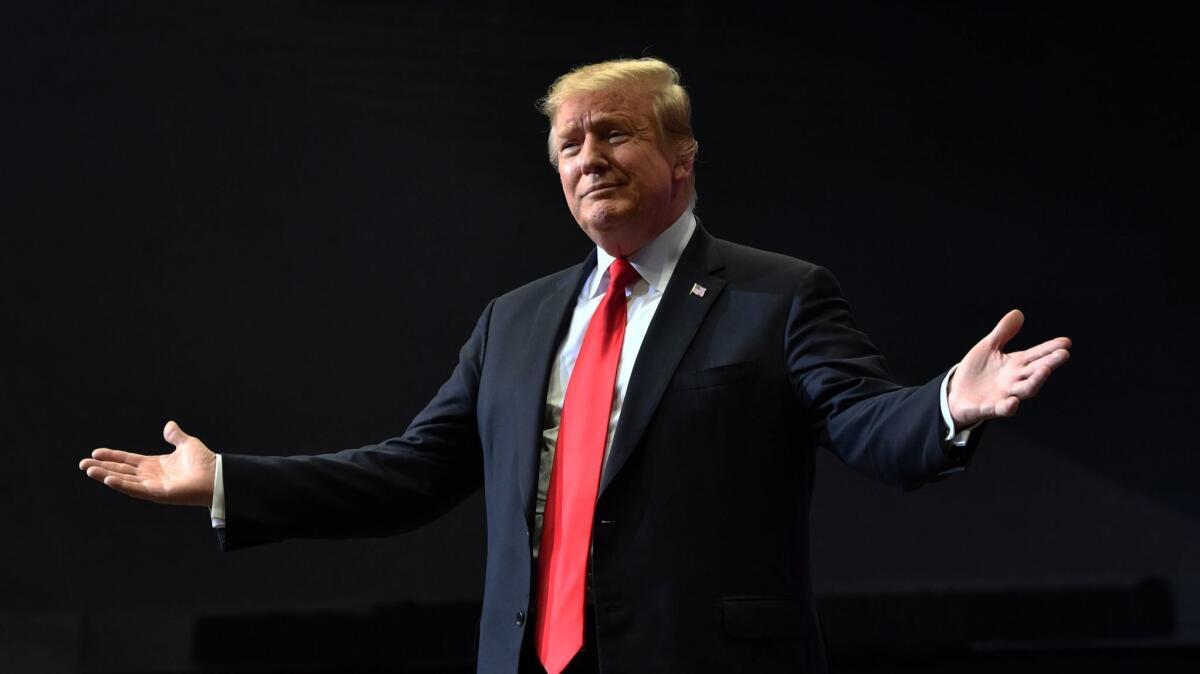Do Americans have a right to healthcare? Neither party has a satisfactory answer

Between his exclamations of “total exoneration,” President Trump has spent much of the week stirring the pot about Obamacare. Here, for example, is what he tweeted Thursday:
Disregard for a moment how Trump and his top aides have bragged about how well Obamacare has been working on their watch. And while we’re at it, disregard the many things the administration has done to discourage people from enrolling and keep premiums higher than they should be. (Sadly, it has been successful on both counts, with enrollment sagging and premiums elevated roughly 16% by various Trump policies, according to Kaiser Family Foundation research).
Instead, just focus on how Trump is politicizing healthcare with yet another empty promise of a “great” Republican solution. Speaking to reporters Thursday, Trump acknowledged that he didn’t actually have a plan. Instead, he said, several GOP lawmakers are working on one.
“I have asked [Sen.] John Barrasso (R-Wyo.), Senator Bill Cassidy (R-La.), who’s a terrific health care person, [Sen.] Rick Scott (R-Fla.) and others to take a look, form a really great plan,” Trump said. “I mean, we’ve put together a group of four or five, and Bill Cassidy is a terrific healthcare person, and they are going to work together to come up with something that’s really spectacular, maybe we’ll even get support in the House from Democrats. But it’s going to be far better than Obamacare.”
That would be the same Bill Cassidy who co-authored a draconian alternative to Obamacare that would have stripped coverage from millions of lower-income people who currently have it. Spectacular!
The problem here, as my colleagues and I on The Times’ editorial board argued Thursday, is that Trump and congressional Democrats seem to want to score political points on healthcare more than they want to improve it. Moving past finger-pointing to legislating requires lawmakers and Trump to come to an agreement on a fundamental question they’ve all been dodging: Do Americans have a right to healthcare?
When Democrats used their control over the House, the Senate and the presidency to push the Affordable Care Act into law in 2010, they took it as a given that healthcare was a right. By contrast, every Republican proposal since then has taken it as a given that healthcare is a privilege — an option for those who can afford it. But we’ve never had an actual debate over that point. Neither side has been forced to defend its underlying assumption.
Democrats — whether they’re in the shore-up-the-ACA camp or the single-payer faction — have to establish a foundation for why healthcare should be a right. And they have to offer a better argument than “it’s the right thing to do,” because many Republicans believe it’s just wrong to force families living paycheck to paycheck to pay for someone else’s health insurance. Conversely, if Republicans want to persuade the country that healthcare is a privilege, they’ll have to come up with an argument that doesn’t sound like they’re just being cheap and insensitive.
House Democrats unveiled a multipronged bill this week to shore up Obamacare’s insurance-buying exchanges and reduce premiums. If I were the House leadership, I’d want an amendment to be offered on the floor declaring that Americans have a right to affordable healthcare. And I’d be ready to back that up with data showing that going without coverage is expensive not just for the uninsured, but more so for the rest of us — much of the cost of their care is passed on, leading to higher federal spending, higher prices for care and higher insurance premiums.
On top of those direct costs, there’s also the indirect cost to the economy of having people delay or skip the care they need to be fully productive members of society. Beyond that, the lack of universal coverage hampers efforts to reform the healthcare system and slow the growth of overall spending.
In short, there’s a compelling economic case to be made for treating healthcare as a right. Democrats ought to try to persuade Republicans with it, because if they can form a consensus around that idea, something really spectacular could, in fact, emerge.
Enter the Fray: First takes on the news of the minute »
More to Read
A cure for the common opinion
Get thought-provoking perspectives with our weekly newsletter.
You may occasionally receive promotional content from the Los Angeles Times.











